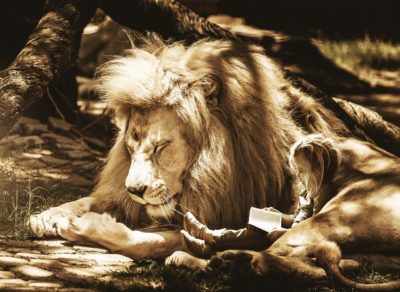Are you a writer? A storyteller? Congratulations. You have an incredible power. And responsibility.

Neuroscientists today say that storytelling has given our species an ability more important even than opposable thumbs. Our empathy makes it possible for us to learn from hearing of another’s experience. Someone we care about is hit; we hurt.
So let me tell you a story:
Once upon a time, a very very very long time ago, all the males in a tribe of apes went for a walk in the woods. When they had walked a long way, they grew tired and sat down in the shade to rest and watch the clouds float by. They sat and sat and sat, and then they fell asleep. Most of them snored.
But one was very quiet. In his dream, he heard a rustle in the leaves, and he saw a lion sneaking through the bushes. He woke up and grabbed his spear—OK, so apes didn’t have spears. I’m just a storyteller, not a paleontologist.
Anyway, he grabbed his spear, and he killed the lion because it was a real lion, not just a dream. Then this young man hid behind a bush and watched another lion come out and kill all his buddies, because they didn’t have the good sense to dream about leaves and lions. Then he walked back to his tribe’s cave and found the ape women cooking dinner. He wasn’t hungry. So while the ape women ate their dinner, he told them what happened to the other ape men. It wasn’t a very long story, because he told only the important parts, not the shapes of the clouds or his dream about swinging on a vine.
While Adam—yes, that’s his name—told his story, the women ate a great deal because they didn’t have to share it with the men, who were all dead. They grew bored and fell asleep, all except one. She was very excited listening to Adam’s story. Her heart beat loudly. She felt like screaming, but she clasped her hand over her mouth because she didn’t want the lion to hear her. Sweat broke out on her forehead. When Adam finished, she was so thrilled she jumped up and ran to him to congratulate him and shake his hand and other parts, and they made lots of babies. I guess you know her name.
Anyway, those babies grew up because Adam was very good at protecting them against lions. And Eve—this is the important part—she was so good at hearing and seeing the lions coming from Adam’s story that every time he told it, her hand reached for a spear, and she got real good at killing lots of lions, too.
Pretty soon the lions had eaten up everyone in that neighborhood except Adam and Eve and their children. By the time those babies were three years old, they too could tell stories and listen to stories and slay lions. So they all lived happily ever after.

No, they didn’t. Remember, I told you that Adam hid behind a bush after he killed the lion. What I left out was that he didn’t even try to wake up his friends. And after the second lion ate all she wanted and left, he came out and ate the leftovers. That’s why he wasn’t hungry when he returned to the cave. And the other thing I left out was that lots of the children’s children’s children got so good at telling stories that there weren’t any lions left in the neighborhood.
Among those descendants, the storytellers linked up with listeners, and all that storytelling resulted in making everyone safer. Their society had changed, due to all that storytelling.
Now after a few million years, with so many dangers under control, the best-fed people get angry whenever anyone tells stories about other dangerous things like climate change or starvation or homelessness or torture or rape or poisonous drugs or drought or ignorance or war. So some people who sell book marketing schemes advise writers not to disturb readers with troublesome matters like racial injustice or slavery or mass murder of school children. Stories are just for fun and entertainment, they tell us, and we’ll just hurt sales by mentioning such topics.
But think about storytelling’s potential to change the world.
A reader reads that a fictional character a thousand miles, or years, away is about to be beaten. That reader anticipates the pain of lashes on her back. She’s compelled to turn the page, to learn what happens next, to pack up and maybe join the Peace Corps.
Stories shape the world. Stories change the world.
Tell the stories that must be told.
And don’t let anyone shut you up.
*****
Want to learn about neuroscientists’ findings about storytelling and what specifically they mean for writing effectively? Read Wired for Story: The Writers’ Guide to Using Brain Science to Hook Readers from the Very First Sentence, by Lisa Cron.
For more on the role of storytelling in society, look at “The Desirability of Storytellers” and “The Psychological Comforts of Storytelling.”

Joan H. Carter
Skipper, you’ve pointed out a great reason to promote the craft of creative writing. Making our writing more effective will improve the chance our stories will impact and spread to more listeners.
Mary Bast
Wow! This is the first time I’ve wept in response to a WAG blog post. Skipper, in addition to your own skill as a storyteller, I love your fervor and strength and unwillingness to give up, ever.
Skipper Hammond
Thanks, Mary. I wish I were as honest and courageous in writing fiction as I challenged others to be. It’s not easy. I can always find excuses for using caution.
Ann-Marie Magné
Wow. You are a mentor in so many ways. Thank you for a beautiful post.